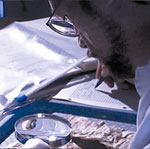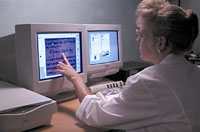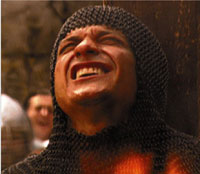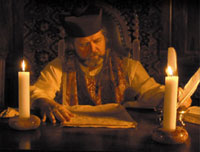 |
A murder mystery!A conspiracy theory!A hidden code!
Dan Brown’s best-selling novel The Da Vinci Code delivers it all: A riveting tale of international intrigue set against a backdrop of religious history. The book has 25 million copies in print and has spent more than two years on the New York Times Bestseller List for Hardcover Fiction.
Almost since the day the controversial novel hit bookstores, evangelicals have discussed it, debated it, and noted its historical and biblical inaccuracies. (There’s plenty to read on those topics right here.) And now Christian filmmakers have jumped into the fray.

Breaking the Da Vinci Code is the latest DVD release from Grizzly Adams Productions, which primarily produces “sweeps week” television specials and series for the PAX-TV Network. The documentary is based on three books from an evangelical perspective: Breaking the Da Vinci Code by Darrell Bock, The Da Vinci Deception by Erwin Lutzer, and Cracking Da Vinci’s Code by James Garlow.
The documentary’s purpose is clearly stated when one expert interviewee says, “Mr. Brown’s assertions of accuracy once again fall before modern scholarship.”
The documentary begins by summarizing the plot and basic premise of The Da Vinci Code for those who have not read it. However, the movie focuses its investigation on Brown’s opening sentence in his book’s preface: “FACT: All descriptions of artwork, architecture, documents and secret rituals in the novel are accurate.” The narrator further clarifies, “Brown’s assertions of fact are central to our investigation of his work, along with the reasons he gave to justify those assertions.”

Thus begins a sweeping examination of the people, places, and events mentioned in The Da Vinci Code. Along the way, Breaking the Da Vinci Code revisits Arthurian legend, the Gnostic Gospels, the Council of Bishops at Nicea, the canonization of the New Testament, the conversion of Constantine and the paintings of the Mona Lisa and The Last Supper.
The documentary also analyzes the origin, nature, and activities of Opus Dei and the Priory of Sion, along with the relationship of Jesus Christ to Mary Magdalene, all of which are central elements of The Da Vinci Code story.
These historic investigations are combined with interviews with authors Bock, Lutzer, and Garlow, plus other noted scholars, historians, and theologians. The producers even attempted to talk to Dan Brown himself, but Brown would not consent to be interviewed or even to allow footage of previously broadcast interviews and appearances in the film.

In addition to questioning Brown’s research, this documentary questions his literary agenda and even his originality, citing a breach-of-contract lawsuit brought against him for theft of intellectual property. According to the film, The Da Vinci Code is remarkably similar—even identical in parts—to an earlier book about the Holy Grail. Additionally, the DVD features interesting bonus interviews organized by historical themes in the novel.
Overall, Breaking the Da Vinci Code is logically structured, well-researched, and keeps a generally fair (albeit evangelical) tone throughout. The documentary accurately represents the story and Brown’s assertions as written in The Da Vinci Code. (Interestingly, however, Brown seems to back away from these on his own website, www.danbrown.com.)
The movie’s cinematic style is also simple yet effective. The documentary covers a lot of issues without being visually distracting, with the minor exception of a few biblical reenactments which feature a long-haired, balding “Anglo-Jesus” and his disciples.

Though Breaking the Da Vinci Code focuses on the reliability—or lack thereof—of Brown’s assertions, I wished it had touched upon the “so what” question. That is, from an apologetic perspective, what would it mean if any part(s) of Brown’s novel were true? What effects, if any, would such revelations have on the truth of the gospel? While most Christians debate the truth of The Da Vinci Code, I know many non-Christians (or “pre-Christians” or “seekers” or whatever term you may prefer) who wonder not whether it is true, but what all the fuss is about, and why it matters. Do we as Christians have a compelling answer?
Viewed for its primary intent, however, Breaking the Da Vinci Code competently delivers what it promises: a thorough examination (and, it would appear, debunking) of the claims that have blurred the term “historical fiction,” stirred a cauldron of controversy, and spurred record-breaking sales.
Talk About It
Discussion starters- Have you read The Da Vinci Code? If so, what was your reaction to the book?
- What did you learn in this movie that you didn’t already know? What’s the most important “takeaway value” of this film?
- Would it be a good idea to loan this DVD to a non-Christian friend who has read The Da Vinci Code? Why or why not? How might it help or hurt your intent to share the gospel with that person?
- Is it important to investigate claims that appear contrary to your faith? Why or why not?
The Family Corner
For parents to considerThis film is not rated and is only available for purchase on the producer’s website. The movie contains no graphically disturbing material, but the material likely won’t be of interest to children and young teens.
Photos © Copyright Paramount Pictures
Copyright © 2005 Christianity Today. Click for reprint information.












